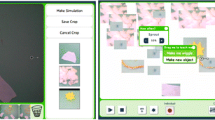Abstract
This study examines a course in which students use two writing activitiesand collaborative group activities to examine the conceptual structure ofthe calculus-based introductory Physics course. Students are presented withtwo alternative frameworks; pre-Galilean Physics and Newtonian Physics. Theidea of the course design is that students would at first view the frameworksalmost in a theatrical sense as a view of a drama involving a conflict of actors;Aristotle, Galileo, Newton and others occurring a long time ago. As participantspassing through a series of interventions, the students become aware that theframeworks relate concepts from different parts of the course and learn to evaluatethe two alternative frameworks. They develop a scientific mindset changing theiroutlook on the course material from the viewpoint that it consists of a tool kit ofassorted practices, classified according to problem type, to the viewpoint that itcomprises a connected structure of concepts.
Similar content being viewed by others
References
Abd-El-Khalick, F. & Lederman, N.G.: 2000, 'The Influence of History of Science Courses on Students' Views of Nature of Science', Journal of Research in Science Teaching 37, 1057-1095.
Berg, R.: 1992, The Video Encyclopedia of Physics Demonstrations, The Education Group, Los Angeles, CA.
Elby, A.: 2001, 'Helping Students Learn How to Learn', American Journal of Physics: Physics Educational Research Supplement 69, S454-S64.
Feyerabend, P.: 1993, Against Method, 3rd edn, Verso, New York, NY, USA: Note that these quotes are also found in the first edition published in 1975. For more details on Feyerabend's analysis, its relationship to conceptual change models and critical thinking see Kalman, C.S.: 2002, 'Developing Critical Thinking in Undergraduate Courses: A Philosophical Approach', Science & Education 11, 83-94.
Fulwiler, T.: 1987, The Journal Book, Heinemann, Portsmouth, NH.
Hammer, D.: 1989, 'Two Approaches to Learning Physics', The Physics Teacher 27(9), 664-670.
Hammer, D.: 1994, 'Epistemological Beliefs in Introductory Physics', Cognition and Instruction 12(2), 151-183.
Hewson, P. & Hewson, M.: 1984, 'The Role of Conceptual Conflict in Conceptual Change and the Design of Scientific Instruction', Instructional Science 13, 1-13.
Huffman, D. & Heller, P.: 1995, 'What Does the Force Concept Inventory Really Measure?', The Physics Teacher 33(3), 138-143.
Kalman, C.S.: 1999, 'Teaching Science to Non-Science Students Using a Student-Centred Classroom', in K. Ahmet & S. Fallows (eds.), Inspiring Students: Case Studies in Motivating the Learner, SEDA-Staff and Educational Development Series, Kogan Page Limited, London, England, pp. 17-24.
Kalman, C.S.: 2002, 'Generating Effective In-Class Discussions', The Successful Professor 1(5).
Kalman, C.S., Morris, S., Cottin, C. & Gordon, R.: 1999, 'Promoting Conceptual Change Using Collaborative Groups in Quantitative Gateway Courses', American Journal of Physics; Physics Educational Research Supplement 67, S45-S51.
Kalman, C.S., Rohar, S. & Wells, D.: 2003, 'Promoting Conceptual Change Using Writing-to-Learn Methods which Enhance Critical Thinking in Quantitative Gateway Courses', American Journal of Physics: Physics Educational Research Supplement. To be published.
Kuhn, T.S.: 1970, The Structure of Scientific Revolution, 2nd edn., University of Chicago Press, Chicago, IL.
Kuhn, T.S.: 1992, The Trouble with Historical Philosophy of Science, (The Robert and Maurine Roschild Lecture, 19 November 1991), Department of History of Science, Harvard University, Cambridge, MA.
Lakatos, I.: 1970, 'Falsification and the Methodology of Scientific Research Programs', in I. Lakatos & A. Musgrove (eds.), Criticism and the Growth of Knowledge, Cambridge University Press, New York, NY, USA, pp. 91-196.
Merriam, S.B.: 1988, Case Study Research in Education: A Qualitative Approach, Jossey-Bass, San Francisco, CA.
Pintrich, P., Marx, R. & Boyle, R.: 1993, 'Beyond Cold Conceptual Change: The Role of Motivational Beliefs and Classroom Contextual Factors in the Process of Conceptual Change', Reviews of Educational Research 63, 167-199.
Redish, E.M., Saul, J.M. & Steinberg, R.N.: 1998, 'Student Expectations in Introductory Physics', American Journal of Physics 66(3), 212-224.
Stake, R.E.: 1998, 'Case studies', in N.K. Denison & Y.S. Lincoln (eds.), Handbook of Qualitative Research in Education, Prentice Hall, New York, NY.
Author information
Authors and Affiliations
Rights and permissions
About this article
Cite this article
Kalman, C.S., Aulls, M.W. Can an Analysis of the Contrast Between pre-Galilean and Newtonian Theoretical Frameworks Help Students Develop a Scientific Mindset. Science & Education 12, 761–772 (2003). https://doi.org/10.1023/B:SCED.0000004554.35266.7a
Issue Date:
DOI: https://doi.org/10.1023/B:SCED.0000004554.35266.7a




